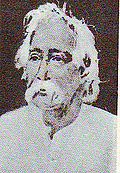- Mahendralal Sarkar
-
Mahendralal Sarkar Born November 2, 1833
Paikpara village, Howrah districtDied February 23, 1904
CalcuttaOccupation Physician, Academic Spouse Rajkumari Mahendralal Sarkar (other spellings: Mahendra Lal Sarkar, Mahendralal Sircar, Mahendralal Sircir) (1833–1904) was a conventional-turned-homeopath doctor, social reformer, and propagator of scientific studies in nineteenth-century India. He was the founder of the Indian Association for the Cultivation of Science.[1]
Contents
Early life and education
Mahendralal Sarkar was born at Paikpara village in Howrah district, near Calcutta (now known as Kolkata) in the Bengal Province of British India. He lost both his parents early in life, his father when he was five years old and his mother when he was nine years old. His mother had shifted to his maternal uncles’ house earlier and subsequently, he was brought up by his maternal uncles, Iswar Chandra Ghosh and Mahesh Chandra Ghosh in their house at Nebutala in Calcutta. First he was sent to a ‘gurumasai’ or tutor to learn Bengali and subsequently to another tutor named Thakurdas Dey, to learn English. On learning some English he secured admission in Hare School as a free student in 1840. In 1849, he passed the junior scholarship examination and joined Hindu College, where he studied up to 1854. At that time, Hindu College did not have facilities for teaching science and as he was bent upon studying medicine, he transferred to Calcutta Medical College. He obtained IMS in 1861 and MD degrees in 1863. He and Jagabandhu Bose were the second MDs of the Calcutta University after Chandrakumar De (1862).[1][2][3]
Career
Although educated in the traditional European system of medicine, Mahendralal Sarkar turned to homeopathy. He was influenced by reading William Morgan's The Philosophy of Homeopathy, and by interaction with Rajendralal Dutt, a leading homeopath practitioner of Calcutta. Indeed, in a meeting of the Bengal branch of the British Medical Association, he proclaimed homeopathy to be superior to the "Western medicine" of the time. Consequently, he was ostracised by the British doctors, and had to undergo loss in practice for some time.[4] However, soon he regained his practice and went on to become a leading homeopath practitioner in Calcutta, as well as India.[1]
In course of his career, he treated several notable persons of those days, including the author Bankimchandra Chattopadhyay, the ascetic Ramakrishna, the Maharaja of Tripura and others.
Championing scientific knowledge and higher education
Mahendralal Sarkar started a campaign in 1867 for a national science association. He planned for an association that would be funded, run, and managed by native Indians, with the aim of turning out a pool of scientists for national reconstruction.[1] The Indian Association for the Cultivation of Science (IACS) was established in 1876, and Sarkar was its first director.[5] IACS was the first national science association of India.[5] Basic science departments such as Physics, Chemistry, Mathematics, Physiology, Geology, Botany, etc. were established, and notable Indian scientists participated in the association. Regular lectures and demonstrations were arranged for the public in order to popularise science.[5]
Mahendralal supported women's education in nineteenth-century India, when higher education among women was rare. For example, he was a supporter of Abala Bose's decision to pursue the study of medicine in Madras Medical College instead of Calcutta Medical College, where admission of females was not permitted. He also arranged for Sarala Devi Chaudhurani's attendance in the evening lectures in IACS, so that she could pursue higher studies in Physics.[6]
Other achievements
He was a fellow of Calcutta University, an honorary magistrate and Sheriff of Calcutta (1887), He was made a C.I.E. in 1883 and honoured with a doctor of law degree by Calcutta University in 1898.[3]
Notes
- ^ a b c d Palit, Chittabrata. "Sircir, Mahendralal". Banglapedia. Asiatic Society of Bangladesh. http://banglapedia.search.com.bd/HT/S_0414.htm. Retrieved 2008-04-21.
- ^ Sastri, Sivanath, Ramtanu Lahiri O Tatkalin Banga Samaj, 1903/2001, (Bengali), pp. 170-176, New Age Publishers Pvt. Ltd.
- ^ a b Sengupta, Subodh Chandra and Bose, Anjali (editors), 1998 edition, Sansad Bangali Charitabhidhan (Biographical dictionary) Vol I, (Bengali), p. 408, ISBN 8185626650
- ^ Das, Eswara (2005). "India". History & Status of Homoeopathy Around the World. B. Jain Publishers. pp. 103–107. ISBN 8180565734.
- ^ a b c Palit, Chittabrata. "Indian Association for the Cultivation of Science". Banglapedia. Asiatic Society of Bangladesh. http://banglapedia.search.com.bd/HT/I_0042.htm. Retrieved 2008-04-21.
- ^ Thorner, Alice; Raj, Maithreyi Krishna (2000). Ideals, Images, and Real Lives: Women in Literature and History. Sameeksha Trust. Orient Longman. pp. 51–52. ISBN 8125008438.
Categories:- 1833 births
- 1904 deaths
- Presidency University, Kolkata alumni
- Medical College and Hospital, Kolkata
- University of Calcutta alumni
- Institute directors
- Indian doctors
- People from Kolkata
- People from Howrah district
- Founders of Indian schools and colleges
- Companions of the Order of the Indian Empire
- Sheriffs of Kolkata
- Indian homeopaths
Wikimedia Foundation. 2010.

